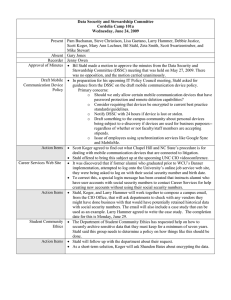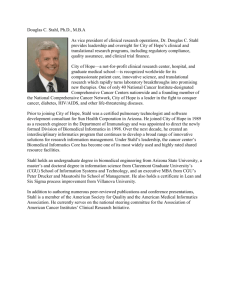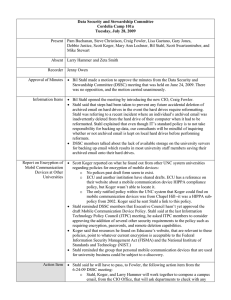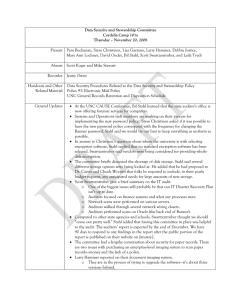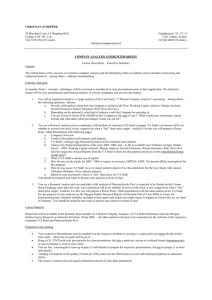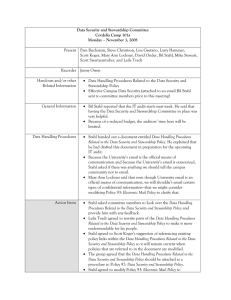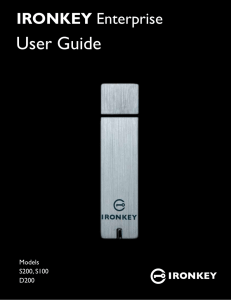Present Pam Buchanan, Steve Christison, Robert Edwards (for
advertisement
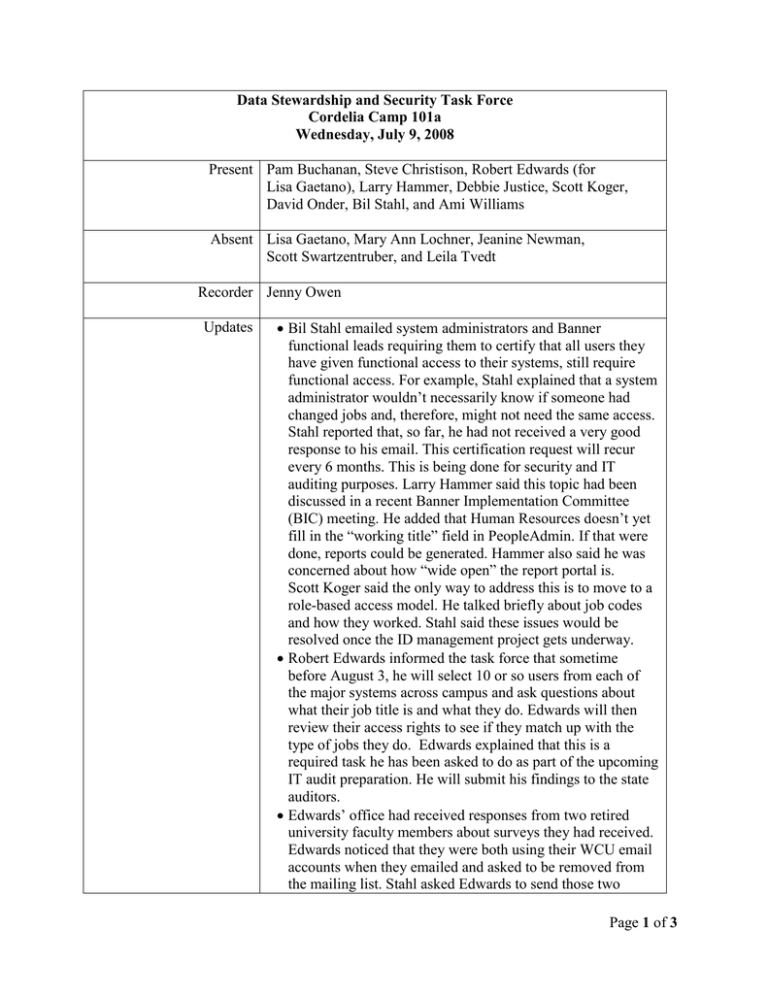
Data Stewardship and Security Task Force Cordelia Camp 101a Wednesday, July 9, 2008 Present Pam Buchanan, Steve Christison, Robert Edwards (for Lisa Gaetano), Larry Hammer, Debbie Justice, Scott Koger, David Onder, Bil Stahl, and Ami Williams Absent Lisa Gaetano, Mary Ann Lochner, Jeanine Newman, Scott Swartzentruber, and Leila Tvedt Recorder Jenny Owen Updates Bil Stahl emailed system administrators and Banner functional leads requiring them to certify that all users they have given functional access to their systems, still require functional access. For example, Stahl explained that a system administrator wouldn’t necessarily know if someone had changed jobs and, therefore, might not need the same access. Stahl reported that, so far, he had not received a very good response to his email. This certification request will recur every 6 months. This is being done for security and IT auditing purposes. Larry Hammer said this topic had been discussed in a recent Banner Implementation Committee (BIC) meeting. He added that Human Resources doesn’t yet fill in the “working title” field in PeopleAdmin. If that were done, reports could be generated. Hammer also said he was concerned about how “wide open” the report portal is. Scott Koger said the only way to address this is to move to a role-based access model. He talked briefly about job codes and how they worked. Stahl said these issues would be resolved once the ID management project gets underway. Robert Edwards informed the task force that sometime before August 3, he will select 10 or so users from each of the major systems across campus and ask questions about what their job title is and what they do. Edwards will then review their access rights to see if they match up with the type of jobs they do. Edwards explained that this is a required task he has been asked to do as part of the upcoming IT audit preparation. He will submit his findings to the state auditors. Edwards’ office had received responses from two retired university faculty members about surveys they had received. Edwards noticed that they were both using their WCU email accounts when they emailed and asked to be removed from the mailing list. Stahl asked Edwards to send those two Page 1 of 3 names to Shandon Bates so they can be reviewed to see if they should be removed from or remain in the Active Directory. Stahl explained that a process was being worked on that would allow a person in a position of responsibility at the university to sponsor someone who doesn’t have an official role at the university—thereby allowing them to have a WCU email account. Steve Christison asked a question about an article that Stahl had sent out from The Chronicle about disk encryption technology. He asked if encryption was effective and if it was cost viable. After a brief discussion, Koger said he would highly recommend whole disk encryption for all mobile devices. Stahl added that he is investigating whether or not the university could make IronKey (a brand of flash drive) a university standard. If this is approved, it would mean that if university funds are used to purchase a flash drive, it would have to be for the IronKey brand. Koger explained the IronKey flash drive provided military-grade security and was one of the best secure flash drives available. Stahl said we also need to look at security on personally owned laptops and the use of virtualization. Stahl reported to the task force about a new group that had been formed to deal with laptop theft--the Computer Incident Response Team (CIRT). One issue CIRT has been dealing with is the potential liability issues that could occur if secure information on a stolen laptop is leaked vs. keeping the information on the stolen laptop so the police can increase their chances for a successful criminal prosecution. CIRT members have each other’s cell phone numbers. They agreed that if there is even a hint that secure information might be on the hard drive of a stolen laptop, they will approve using Computrace to “blow away” the data. This will be done without conferring with the police. It’s still not known if the entire hard drive will have to be wiped out or if just specific folders/files can be targeted. Stahl, Koger, and Mary Ann Lochner will be going to Chapel Hill to attend the first UNC Security Council meeting. This new council was established by the UNC CIOs. It will be comprised of CIOs, attorneys, and security officers from each of the 16 university systems. Stahl mentioned that several policies will be coming forward in the near future: a password policy and a remote access policy. Action Items Hammer said no Banner process existed that would expire pins. He asked if someone in IT could create a job to run that Page 2 of 3 that would set blank pins expiration dates to something other than leaving them blank. Stahl agreed to talk to Stan Hammer about this. Koger asked the group to let him know if they saw any need for a policy that would help them in their day to day roles. Page 3 of 3
